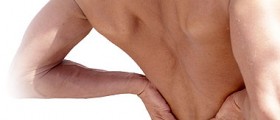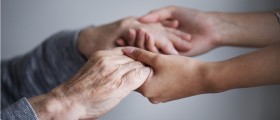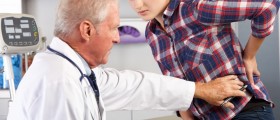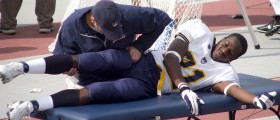Testicle pain is the pain in one or both testicles and can spread to the lower abdomen. They are very sensitive to the touch, and if one feels sudden and severe pain in the testicle, immediate medical intervention is recommended.
Abdominal pain may occur before the pain in the testicles is present. If a man, especially a young man, feels abdominal pain, the scrotum should be carefully examined because it can be a sign of testicular torsion. It is the condition when the testicles are twisted. That cuts off the blood supply. It is a very serious condition that causes the tissues to die off. If a lump is found on the testicles, it should be carefully examined because it can be a symptom of testicle cancer.

Causes of Testicular Pain
Common causes of testicular pain are injury, testicular inflammation, and testicle torsion which is common in men between 10 and 20 years old. Inflammations can be caused by epididymitis (inflammation of the sperm ducts ) which is caused by chlamydia, and orchitis (inflammation of one or both testicles which is caused by mumps. Often, the fluid can collect itself in the testicles causing swellings and discomfort. Pain can also be caused by hernia. How to treat testicular pain at home?
- Possible identifiable organic causes include structural disorders such as spermatoceles, varicoceles, infection, trauma, fibrosis, tumors, intermittent torsion, torsion of a testicular appendage, chronic epididymitis, low back strain, vasculitis (such as Henoch-Schonlein purpura), post-vasectomy pain syndrome, nerve entrapment from hernia surgery or perineural fibrosis, pelvic floor dysfunction, or referred pain from another site such as a ureteral stone. Less common causes include diabetic neuropathy, retroperitoneal tumors, interstitial cystitis, abdominal aortic aneurysms, peritonitis, amiodarone-induced epididymal inflammation, pelvic musculoskeletal disorders, osteitis pubis, and polyarteritis nodosa.
- Henoch-Schonlein purpura is an uncommon cause of chronic testicular pain but should be considered as part of the differential diagnosis, particularly in younger patients (younger than 20 years). It is a systemic vasculitis with a peak incidence around age 4 to 5 years. It involves the scrotum between 2% and 38% of the time and can sometimes be misdiagnosed as an acute testicular problem requiring urgent surgery. It is characterized by marked edema of the scrotum with intact testicular vascular flow, an enlarged epididymis, and a hydrocele.
- Chronic orchialgia most commonly appears in men in their mid to late 30s, and the incidence is increasing. It tends to be associated with male factor infertility, chronic prostatitis, lumbar and back pain, stress, and irritable bowel syndrome.
- A urinalysis and urine culture should be routinely performed. A semen culture should be obtained in selected patients. Testosterone and B-12 levels are often deficient in many patients (76%) with chronic orchialgia. Some pain relief has been reported when restorative therapies have been utilized.
If the pain is mild, caused by a minor injury, or by fluid collection, one can try to ease it by applying ice to the scrotum, taking a warm bath, or wearing an athletic support. If the pain gets more severe, a fever develops, or if the injury is severe and accompanied by vomiting and nausea, a person should seek medical attention. The doctor will probably ask how long have you been experiencing the pain, is one testicle affected or both, is the pain constant, did the pain develops gradually, what color is the urine, and such.
Treatment
Depending on the cause of the testicular pain, different approaches will be used to treat it. For example, if a person has a testicular torsion, the testicles will have to be untwisted. This can be done by physical means or, if that is unsuccessful, by a simple surgery. If an infection is causing the pain, antibiotics will be used.
Preventing testicular pain
A person involved in a contact sport, whether it's football or some kind of martial sport, should always wear a supporter to prevent injuries. When having sex, one should wear a condom to prevent sexually transmitted diseases. One should make a monthly testicular self-test.

















Your thoughts on this
Loading...